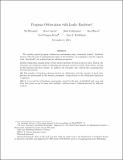| dc.contributor.author | Bitansky, Nir | |
| dc.contributor.author | Canetti, Ran | |
| dc.contributor.author | Goldwasser, Shafi | |
| dc.contributor.author | Halevi, Shai | |
| dc.contributor.author | Kalai, Yael Tauman | |
| dc.contributor.author | Rothblum, Guy N. | |
| dc.date.accessioned | 2014-05-09T16:54:23Z | |
| dc.date.available | 2014-05-09T16:54:23Z | |
| dc.date.issued | 2011 | |
| dc.identifier.isbn | 978-3-642-25384-3 | |
| dc.identifier.isbn | 978-3-642-25385-0 | |
| dc.identifier.issn | 0302-9743 | |
| dc.identifier.issn | 1611-3349 | |
| dc.identifier.uri | http://hdl.handle.net/1721.1/86914 | |
| dc.description.abstract | We consider general program obfuscation mechanisms using “somewhat trusted” hardware devices, with the goal of minimizing the usage of the hardware, its complexity, and the required trust. Specifically, our solution has the following properties:
(i) The obfuscation remains secure even if all the hardware devices in use are leaky. That is, the adversary can obtain the result of evaluating any function on the local state of the device, as long as this function has short output. In addition the adversary also controls the communication between the devices.
(ii) The number of hardware devices used in an obfuscation and the amount of work they perform are polynomial in the security parameter independently of the obfuscated function’s complexity.
(iii) A (universal) set of hardware components, owned by the user, is initialized only once and from that point on can be used with multiple “software-based” obfuscations sent by different vendors. | en_US |
| dc.description.sponsorship | European Commission (Marie Curie International Reintegration Grant) | en_US |
| dc.description.sponsorship | Israel Science Foundation (Grant) | en_US |
| dc.description.sponsorship | Check Point Institute for Information Security | en_US |
| dc.description.sponsorship | National Science Foundation (U.S.) (NSF grant CCF-0832797) | en_US |
| dc.description.sponsorship | Computing Research Association (Computing Innovation Fellowship) | en_US |
| dc.language.iso | en_US | |
| dc.publisher | Springer-Verlag Berlin Heidelberg | en_US |
| dc.relation.isversionof | http://dx.doi.org/10.1007/978-3-642-25385-0_39 | en_US |
| dc.rights | Creative Commons Attribution-Noncommercial-Share Alike | en_US |
| dc.rights.uri | http://creativecommons.org/licenses/by-nc-sa/4.0/ | en_US |
| dc.source | Other repository | en_US |
| dc.title | Program Obfuscation with Leaky Hardware | en_US |
| dc.type | Article | en_US |
| dc.identifier.citation | Bitansky, Nir, Ran Canetti, Shafi Goldwasser, Shai Halevi, Yael Tauman Kalai, and Guy N. Rothblum. “Program Obfuscation with Leaky Hardware.” Advances in Cryptology – ASIACRYPT 2011 (Lecture Notes in Computer Science; volume 7073) (2011): 722–739. | en_US |
| dc.contributor.department | Massachusetts Institute of Technology. Department of Electrical Engineering and Computer Science | en_US |
| dc.contributor.mitauthor | Goldwasser, Shafi | en_US |
| dc.relation.journal | Advances in Cryptology – ASIACRYPT 2011 | en_US |
| dc.eprint.version | Author's final manuscript | en_US |
| dc.type.uri | http://purl.org/eprint/type/ConferencePaper | en_US |
| eprint.status | http://purl.org/eprint/status/NonPeerReviewed | en_US |
| dspace.orderedauthors | Bitansky, Nir; Canetti, Ran; Goldwasser, Shafi; Halevi, Shai; Kalai, Yael Tauman; Rothblum, Guy N. | en_US |
| dc.identifier.orcid | https://orcid.org/0000-0003-4728-1535 | |
| mit.license | OPEN_ACCESS_POLICY | en_US |
| mit.metadata.status | Complete | |

